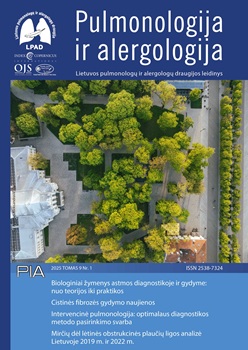TREATMENT OF ANAPLASTIC LYMPHOMA KINASE POSITIVE METASTATIC NON-SMALL CELL LUNG CANCER IN THE ERA OF PRECISION ONCOLOGY
Keywords:
non-small cell lung cancer, anaplastic lymphoma kinase, tyrosine kinase inhibitors
Abstract
Anaplastic lymphoma kinase (ALK)-positive non-small cell lung cancer (NSCLC) accounts for approximately 27% of all NSCLC cases. ALK rearrangements are typically identified by fluorescence in situ hybridization (FISH), immunohistochemistry (IHC), or next-generation sequencing (NGS). Treatment options include first, second, and third-generation tyrosine kinase inhibitors (TKIs), which vary in clinical efficacy and toxicity profiles. Clinical trials have demonstrated that lorlatinib provides the longest progression-free survival. In cases of disease progression, repeat histological analysis of the tumor is recommended to identify resistance mechanisms and guide subsequent therapy.
How to Cite
1.
Vasiliauskas G. TREATMENT OF ANAPLASTIC LYMPHOMA KINASE POSITIVE METASTATIC NON-SMALL CELL LUNG CANCER IN THE ERA OF PRECISION ONCOLOGY [Internet]. PIA 2025 Jun.;9(1):94-98.[cited 2025 Dec. 7 ] Available from: http://pia.pulmoalerg.lt/index.php/PIA/article/view/1709
Section
Pharmacotherapy


